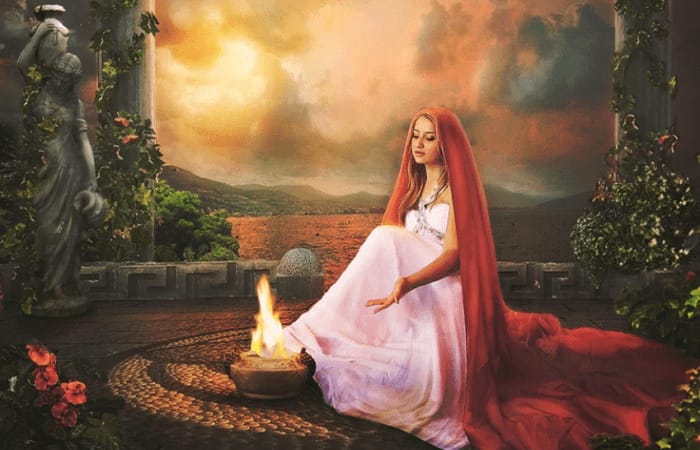In Greek mythology, Hestia is the Goddess of Home and family. Although she is a central figure in the daily life of the ancient Greeks. She has a low key role in this mythology.

Who was Hestia?
Was the Greek goddess of the home, and family. She is usually considered one of the twelve Olympian gods living on Mount Olympus. Because she did not marry or have children, she was not as involved in many of the Greek stories and myths as the other gods.
Birth of Hestia
She was the first child of the Titan rulers Cronus and Rhea. Being the firstborn, she was also the first of her siblings swallowed by her father Cronus. When Cronus was forced to spit out his children by Zeus, Hestia was the last to leave. In a sense she was the eldest and youngest of her siblings. The siblings included fellow Olympians Zeus, Demeter, Hera, Hades and Poseidon. Together with her siblings, Hestia defeated the Titans and joined Zeus on Mount Olympus.
Appearance
She was usually depicted as a modest woman wearing a veil and holding a flowering branch. She was a kind and gentle god who did not get involved with the politics and rivalries of the other Olympian gods.
The personality of Hestia
Her role in helping Percy understand his enemy’s background through his childhood and upbringing shows the extent to which Hestia fully understands the importance that family and home can have on a person, which is why the goddess dedicates her life to ensuring the harmony and happiness of every home she cares for and protects.

Proving time and again that she is a caring and responsible goddess as she guides and advises Percy on his journey on the last Olympian, she also shows signs of great strength, courage and wisdom as she participates in the final battle against her father, the titan Cronus.
Although her role in the previous books was either totally absent or very small and irrelevant, the goddess of the hearth appears when it matters most. She plays a crucial role in the events that take place, as well as in their resolution, with grace, purity and an unwavering will to do what is right for the world and for her own family.
The Greek goddess was one of the 3 virgin goddesses
Along with Athena, goddess of wisdom and strategy, and Artemis, the goddess of hunting, she was one of the three virgin goddesses and one of the twelve Olympian deities. She was the goddess of the hearth, architecture, domesticity, family, home and state.
Promise to Zeus
To her last brother Zeus she made a promise to always remain a virgin. Because of this oath, Hestia rejected the marriage proposals of Poseidon and Apollo, as it was now determined that she would always be untouched by men.
Although Hestia made this promise to Zeus, home and family were her domain. She was the personification of every fire that burned in every home in Greece. There was also a public hearth in every city that burned in honor of Hestia. This was a fire that could never be extinguished. When new colonies were founded, a flame was carried from the old city to the new.
Meals in every household in Ancient Greece began and ended with an offering to Hestia. The newborns of the family were blessed as they were presented in her home. Many Greek temples had a “Hestia” area, including the Temple of Apollo at Delphi.
What were her abilities?
Because she was the goddess of hearth and family, she was considered the hearth of Mount Olympus, the home of the gods, and the home of all the gods and goddesses themselves. She also personified the fire that burned in Greek homes.
Hestia was the one who welcomed people into their homes, while watching over and guarding them. It is believed that Hestia helped and taught the people of Greece how to build their houses. This reinforced her status as the most kind and true protector of the home and family.
Hestia and the vow to Zeus
The goddess made a vow to her brother Zeus that she would always be a maiden. This meant that the goddess of the hearth could not bind herself to any man, either by marriage or physical intimacy. She kept her promise to Zeus, and refused all proposals of marriage that came her way. These included those made by Poseidon, god of the sea, and Apollo, god of war, both very powerful and influential deities. The impossibility of renouncing her virginity meant that she could not bear children of her own. Therefore, Hestia remained childless and devoted herself to caring for the families of others.
what role does Hestia play in the Percy Jackson books?
The first time Hestia appears in the Percy Jackson book series, the goddess goes rather unnoticed. In The Lightning Thief, Percy sees a girl by the fireplace at Camp Half-Blood, not realizing that she herself was the goddess. Very much in agreement with your low mentions in Greek Mythology!
Only in The Last Olympian does Hestia arrive, who really shines and makes a difference. The goddess appears to Percy Jackson in Connecticut with an omen. If Percy really wants to understand his enemy, Luke, he needs to understand his family.
Here, she comes to Percy as an eight-year-old girl with red eyes. She gives him visions of what happened to Luke as a child, and why he became what he is. Again being the truth for her, Hestia is the one who constantly reminds Percy that once the gods are gone to fight, home and family will endure.
Hestia in the Percy Jackson series
Hestia’s role goes further, as she is also the goddess who helps Rachel Elizabeth become the Oracle of Delphi, and the one Percy enlists as the guardian of Pandora’s Pythos.
Hestia plays a crucial role in the battle of Manhattan on Mount Olympus. She is the one who prevents Cronus from taking possession of Luke’s sword, Backbiter, once it falls into the hearth. She accomplishes this by heating it to such an incredibly high temperature that the Titan cannot retrieve the sword.
As in Greek mythology, in the Percy Jackson books, Hestia is revealed as a kind and gentle goddess. Her deep desire to keep all families, including her own, calm, happy and free from turbulence is presented as one of her greatest traits.
Are there Greek temples dedicated to Hestia?
In ancient Greece, Hestia had no public cult to be worshipped. However, each city had a common hearth that was kept alight at all times in honor of the goddess. In addition, households throughout the country kept their own personal hearth in the name of Hestia. During meals, families poured sweet wine in her honor. They also granted her the largest portion of food before meals, and worshipped her afterwards.
Although she remained with very few temples, she was often worshipped in others, regardless of which god they were dedicated to. This only goes to show that the people never forgot her importance and were very grateful for her watchful eye, care and protection. No temples, no children, simple, modest and kind, the Goddess of the Hearth, was always appreciated and loved throughout ancient Greece, by gods and mortals alike.
The Temple of Apollo at Delphi, Greece
She is omitted from many stories and does not play a significant role in Greek mythology. This does not mean that she was not important. In many ways, she could be considered a Goddess that people interacted with on a daily basis.

She was considered one of the kindest and most compassionate of all the gods. Perhaps the first example of a benign God or Goddess. Generally speaking, Hestia has a low key role in Greek mythology.
Cult of Hestia
Although not prominent in the stories of Greek mythology, the worship of Hestia was an important part of ancient Greek life. The first offering of every home sacrifice was given to Hestia. When a new colony was established, the flame of this goddess would be brought to the new city to light its home.
Interesting facts about the Greek goddess Hestia
- She is only sometimes included in the list of the Twelve Olympian gods. When she is not included, Dionysus is included in her place.
- Hestia never married or had children. Zeus granted her the right to remain an eternal virgin. In many ways she was the opposite of the goddess Aphrodite.
- Both Apollo and Poseidon wanted to marry Hestia, but she refused.
- Hestia is the Greek word for “hearth.” The hearth is the hearth floor.

